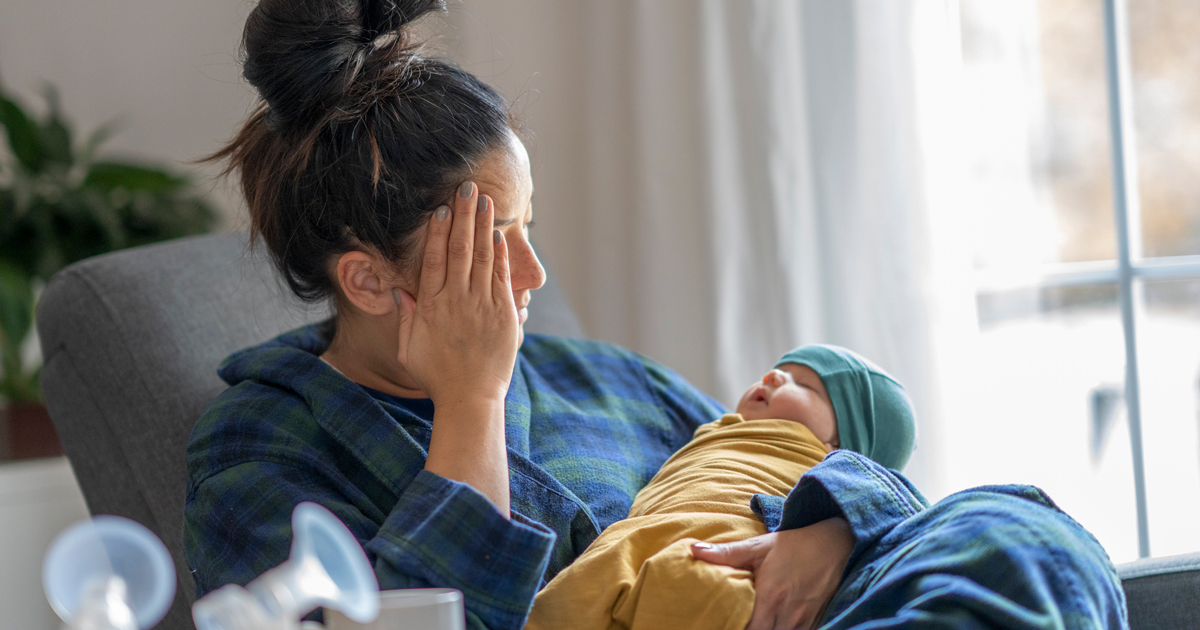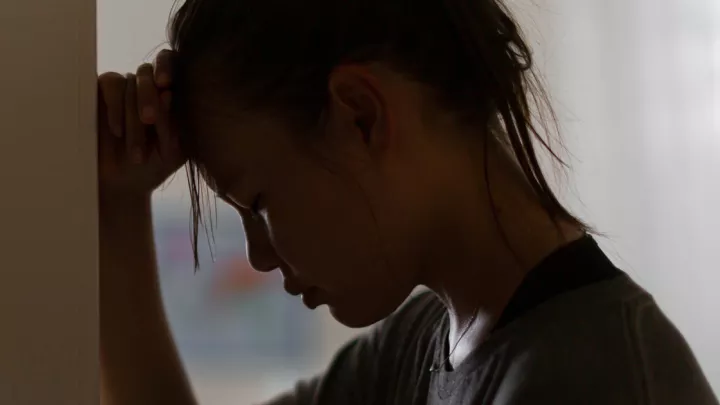Night sweats, hair changes and 5 other postpartum symptoms nobody warns you about

After having a baby, your body has been through a lot. Because of all the significant emotional, mental and physical changes, some call this the fourth trimester.
Pregnancy is over. Parenthood has begun.
When it comes to postpartum symptoms, your OB-GYN has seen it all – and then some. "If you're concerned enough to Google a symptom, asking your provider about it is a great idea," says OB-GYN Mary Kinyoun, MD.
If you have an established relationship with your provider, you don't even need to wait for an in-person appointment. You can message them directly in the Nebraska Medicine app. "I answer messages through our patient portal all the time," says Dr. Kinyoun.
Newborns take a lot of time and energy, all while your body goes through multiple shifts and begins to heal. So don't be too surprised if you experience any of these seven postpartum symptoms.
1. Hair changes, especially losing hair
"Hair follicles can prematurely die in response to birth. This is called telogen gravidarum. As a result, postpartum hair loss is extremely common," says Dr. Kinyoun.
What to do: Unfortunately, there is not much to do to prevent or treat this. Continue taking your prenatal vitamins following delivery – particularly for as long as your continue to breastfeed.
2. Postpartum night sweats
"After delivery, you have a big drop in your hormones, especially estrogen, right away," says Dr. Kinyoun. "This can cause significant night sweats. As in, change your pajamas and sheets when you wake up, significant."
What to do: Boost airflow by opening a window or turning on a fan at night. Wear loose, natural fabrics like cotton, linen or silk. Call your doctor if you are experiencing any true fevers that would be concerning for a postpartum infection.
3. C-section incisions
Delivery can be tough on your body. Even planned procedures like a C-section take time to heal from. About a third of women deliver via C-section, meaning through the abdomen.
Your first postpartum visit will include a head-to-toe exam. Your provider will take a look at your heart, lungs, belly, breasts and pelvic area. If you had a C-section, you'll get your incision examined.
What to do: Keep the incision area clean to avoid infection. Avoid heavy lifting or stretching movements until your provider says so. Take your pain medications as prescribed. Heat packs and ice packs can be helpful. Some women also find an abdominal binder to be helpful. High-waisted underwear and pants can also help avoid your clothes rubbing against the incision.
4. Mood shifts
Having a baby is a huge life change, so it's normal to feel worried from time to time. But there's a difference between expected hormonal mood changes and postpartum depression or anxiety.
"It's typical to be incredibly happy and grateful for your new baby, and so in love with your new baby, but also to just break out in tears and not know why," explains Dr. Kinyoun.
What to do: If your mood is low all the time, you have trouble caring for your baby or yourself or you have difficulties falling asleep or eating, then that points to something more serious. Reach out to family and friends for help. Contact your OB provider. You can also call 800.922.0000 to make an appointment with reproductive psychiatry. If you are having thoughts of wanting to hurt yourself or hurt others, please go to the Emergency Department immediately.
5. Postpartum vaginal atrophy
Breastfeeding women in particular can experience vaginal dryness, irritation and atrophy.
At your six-week visit, your provider will check for vaginal atrophy. A prescribed vaginal estrogen cream may soothe the area and make sex more comfortable.
What to do: See your OB-GYN about treatment options, including vaginal estrogen creams.
Connect with an Olson Center for Women's Health OB-GYN to get expert tips and treatments to relieve your postpartum symptoms. Call 800.922.0000 to make an appointment.
6. Postpartum hot flashes
"I can say from experience that hot flashes feel terrible," says Dr. Kinyoun. "Unfortunately, they're very common for about six weeks postpartum."
What to do: Drink ice water when you start feeling hot. You might also avoid trigger foods, which include caffeine, alcohol, spicy foods and hot liquids.
7. Vaginal tears
Delivery can result in a perineal tear, a painful opening between your vagina and anus. There can also be tears of the labia. After delivery, your care providers will typically stitch the opening closed.
If you tear into the rectal area, your provider will typically see you one week postpartum to examine the area.
What to do: Gently positioning an ice pack over the area can help with pain and swelling. Using a squirt bottle to gently spray the perineum while voiding can help keep the area clean and prevent stinging that occurs along the suture lines. Be sure to drink plenty of water. Use stool softeners as needed to prevent constipation as you heal from these tears.







